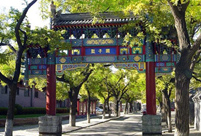 Global ambassadors of ecotourism gather in Nanjing
Global ambassadors of ecotourism gather in Nanjing
 Taiwan woman marries into Kazak family, 100 sheep plus a flat as dowry
Taiwan woman marries into Kazak family, 100 sheep plus a flat as dowry
 College girls take graduation photos under water in Chongqing
College girls take graduation photos under water in Chongqing
 Cartoon: Xi and football
Cartoon: Xi and football
 Chinese influence sweeps ROK
Chinese influence sweeps ROK
 Post-90s beauty boxer grapples four men
Post-90s beauty boxer grapples four men
 3,000-year-old tea town through lenses
3,000-year-old tea town through lenses
 22 archaeological sites along Silk Road in China
22 archaeological sites along Silk Road in China
 Football babies, Samba dancers embrace 'World Cup'
Football babies, Samba dancers embrace 'World Cup'
 Beautiful scenery along China’s Grand Canal
Beautiful scenery along China’s Grand Canal
Free talent scout
Humes has also noted that many foreign translators are no longer sinologists in college, but rather, promising young people working in China as reporters teachers, etc. Many of them only have travel visas, which cannot guarantee their residence or exchanges with Chinese writers while undertaking translations.
“Those freelance translators are a lesser-known part of a ‘supply chain’ that brings Chinese writers together with overseas brokers and publishers,. Some of them are acting effectively as literary talent scouts, even without salaries. Once having discovered a work of real quality, they will translate part of it and recommend it to overseas literary magazines or publishers.” Humes therefore urges visa adjustments that permit legal stays in China for translators of literature and works on traditional Chinese culture when undertaking such translations.
Transparent Internet Platform
Humes adds that suitable Internet platforms, especially English websites that bring together Chinese and foreign writers, translators, literary brokers and publishers, are also vital for Chinese literature to go global.
The article is edited and translated from 圖書欲出 翻譯先進; Source: People’s Daily Overseas Edition.
 'Seattle's soulmate' - -Pike Place Market
'Seattle's soulmate' - -Pike Place Market Human skeletons of more than 1,600 years old
Human skeletons of more than 1,600 years old BFA goddess poses for graduation photos
BFA goddess poses for graduation photos Separate college entrance exam
Separate college entrance exam Flash mob dance
Flash mob dance Featured hutongs in Beijing
Featured hutongs in Beijing Picturesque scenery of Ghost City
Picturesque scenery of Ghost City Female special assault team in training
Female special assault team in training Children attend First Writing Ceremony
Children attend First Writing Ceremony Chengdu police use social media to boost recruitment
Chengdu police use social media to boost recruitment Secrets unveiled in restoration of the 800-yr-old Buddha
Secrets unveiled in restoration of the 800-yr-old Buddha Heavenly path in Chongli grassland
Heavenly path in Chongli grassland Happy Birthday to "Yuanzai"
Happy Birthday to "Yuanzai" China's manned submersible Jiaolong opens to public
China's manned submersible Jiaolong opens to public Roast Duck Restaurant celebrates 150th anniversary
Roast Duck Restaurant celebrates 150th anniversaryDay|Week|Month